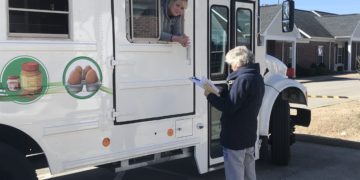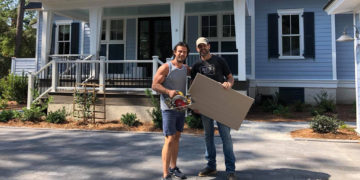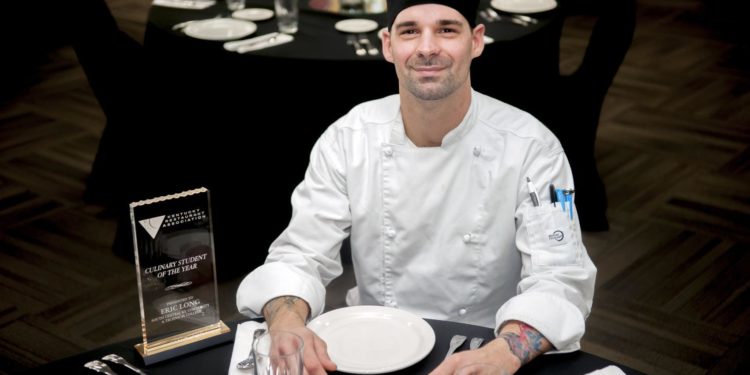Letters emblazoned on a wooden plaque celebrate Eric Long’s latest achievement – “Kentucky Restaurant Association – Culinary Student of the Year.” But there’s no way to really put in words Long’s most profound achievement – completely changing the trajectory of his life.
The award recognizes the SouthCentral Kentucky Community and Technical College student based on his academic achievement, work history and community and civic organization involvement. Just a few years ago, however, Long wouldn’t have imagined such a recognition could be his. As a child, he shuffled around from one foster home to the next for almost seven years. Living in more than a dozen different homes from the ages of 11-18, he learned he couldn’t rely on anyone but himself.
“I grew up in a very unstable childhood, and was in one to three different homes every year from 11-18,” Long said. “From that, I gained a very strong and almost reckless sense of self-reliance. My belief growing up and as a young adult was that I could not depend on anyone to stay in my life. That also developed into a sense of pride – that I never needed to ask anyone for help.”
At one of his lowest points he found himself addicted to drugs and in the Warren County Detention Center for drug-related crimes.
The problem with that, he added, is that when no one shows you how to do things and how to live, a person makes up their own way and their own rules.
“And that doesn’t usually work out so well,” he said.
That, he says, led to some bad decisions that led him into addiction and eventually, to the Warren County Detention Center. And it was there in that cell that Long decided he wanted a change – but he didn’t know where to start.
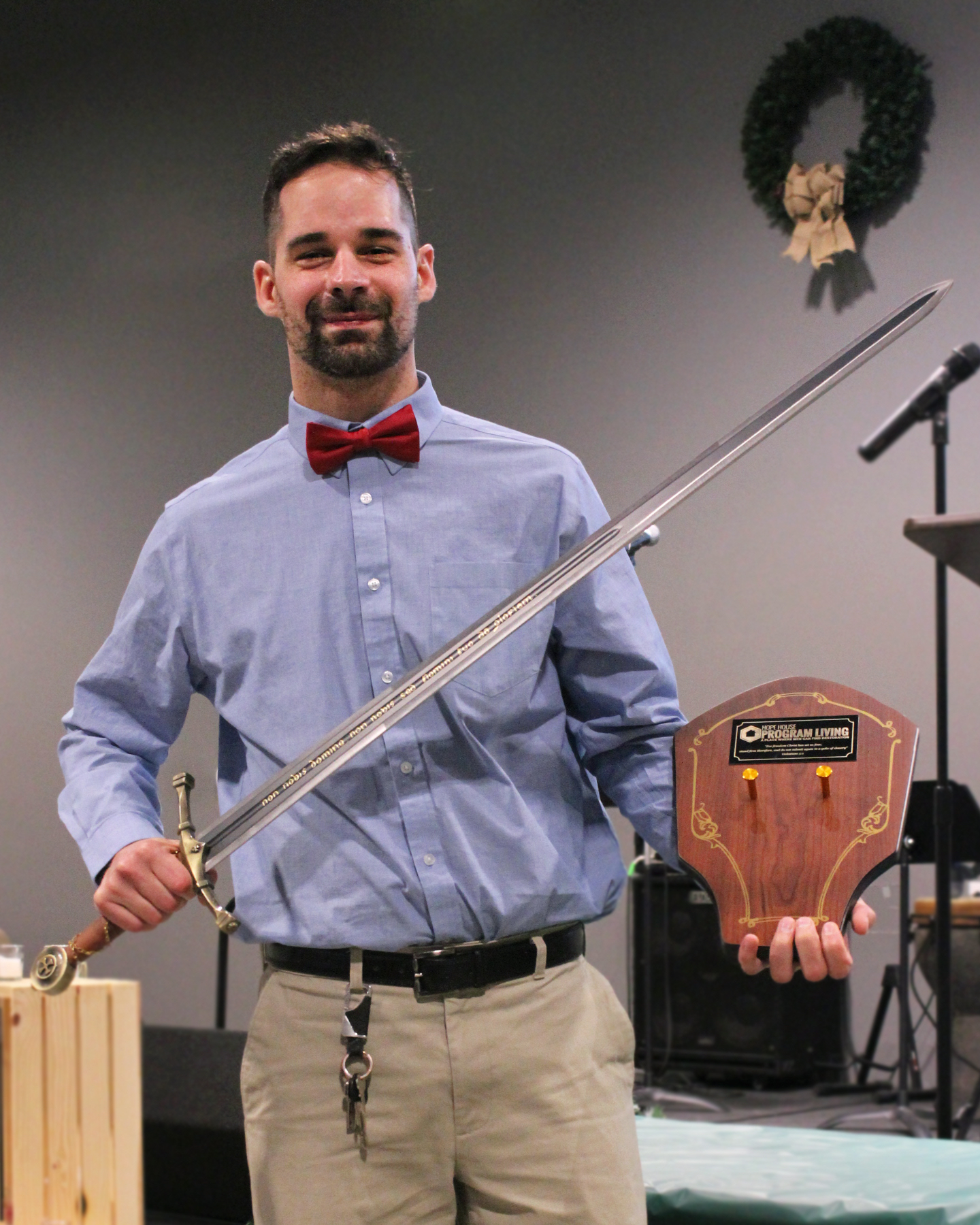
In walked Jon Calloway, Housing Director for Hope House Ministries. The ministry’s residential program defines itself as a heart treatment facility – helping men find recovery and restoration through spiritual, physical, emotional and educational development.
When Long first met Calloway, they had a long discussion about the Hope House residential program and how the ministry addresses real-world problems through fighting what the ministry calls “spiritual poverty.”
“And Eric, in the jail, asked me point blank – why would you care about me?” Calloway said. “I answered honestly. First of all, it’s my job to care. Second and most important – I know what Christ has done in me and in my life, and He called me to be a minister of reconciliation for others.”
Calloway also told Long that he loved him, as Christ loves all of us.
It was, perhaps, the first time Calloway felt someone outside of his family genuinely loved and cared about him. Maybe, thought Eric, Calloway and the people at Hope House would be different. Maybe HE would be different. He decided to give Hope House a chance.
It wasn’t easy, though. The Hope House residential program is specifically designed to build narrow walls around its residents. Long had been used to doing things his own way, without having to answer to anyone. Hope House and its rigid rules was drastically different.
Residents devote more than 700 hours of classroom instructional time during a 12-month span. Those classes range from Bible study, to work readiness skills, to money management. Residents are required to open a savings account, create a budget and address outstanding debt. They also take classes in nutrition – which rekindled in Eric a love of cooking he’d had since the age of 8 – before entering foster care – when he would cook for his brother.
When classroom instruction is finished, Hope House residents are either focussed on physical fitness or participating in supervised work experiences.
“Our goal is to alleviate spiritual and physical poverty through a relationship with Jesus Christ,” said Calloway. “Humanity is prone to worship – so we are going to worship something. For our residents – we try to convey that their addiction has become their god. It’s what they worship. But they are in slavery to it.”
God, he added, doesn’t enslave us but gives us great freedom.
Neither Long or Calloway will sugar coat the early days in the program for Long. He could be stubborn and almost defiant, and doubt trickled in as to whether he would stay at Hope House.
“But as I got into working the program, I started asking questions,” Long said. “And then I felt a call to be there for other people, and that’s really when I started to change.”
Long could feel himself healing physically, mentally and spiritually – the paramount goal of Hope House. In essence, he was moving from a place of spiritual poverty to spiritual abundance.
That spiritual abundance has led to great change – for the good – in Long’s life. He’s the first Hope House resident to attend college. He graduated in December from the Hope House residential program and now serves as a House Shephard, or residential manager – assisting at the facility and serving as a mentor to current residents.
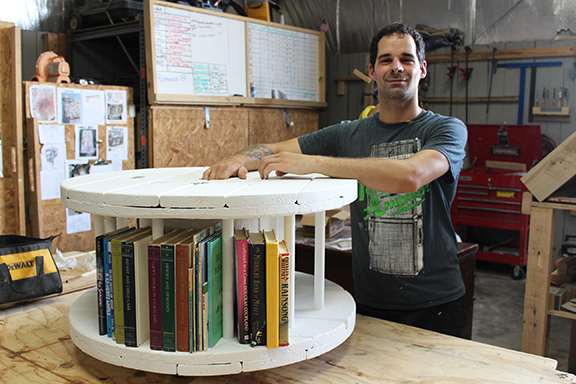
“I feel stronger physically and mentally. I reconnected with family I hadn’t spoken to in years, and I got into school,” he said. “I still am amazed at just how far things were able to improve for me in one year – one year of hard work and opening myself up to other people and to what the Bible wanted me to do.”
And Long is not alone. This August, Hope House Ministries will celebrate 10 years of healing brokenness in the Bowling Green community. The residential program has grown from one housing unit serving 8-10 individuals to a total of three homes that can house up to 30 men. The residential program is just one of many ministries that fall under the Hope House name. Hope House also offers an Advocacy Program that helps assess a person’s needs, provides immediate care if necessary and works with the individual or family to create a plan toward overcoming their obstacles, according to HopeHousebg.com. Jobs for Life is a biblically-based job training program that helps individuals better prepare for a job. The ministry also offers 12-week courses in Faith & Finances and parenting for the public, and a Ready to Work shuttle that transports individuals who are willing to work but for whom transportation is an obstacle.
“Last year, out of the people riding our shuttle, 15 were either homeless or living at the Salvation Army, and now they have their own housing,” said Bryan Lewis, Executive Director of Hope House Ministries. “We have individuals who want to work, but they couldn’t get access to the pond. So we created a way for them to have access so they could fish, do labor and provide for their families.”
“Our mission was to identify ways to partner with individuals in the neighborhood to not create dependencies, but opportunities for empowerment,” said Lewis. “We exist to relieve spiritual and physical poverty through Gospel restoration, and our heartbeat is to see how value and dignity can be restored in a person through the personal work of Jesus Christ.”




